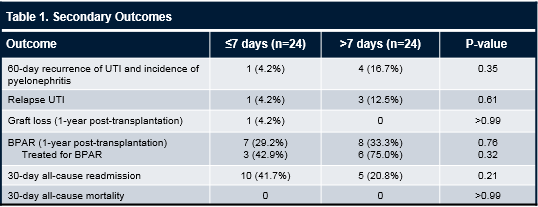Impact of Antibiotic Treatment Duration for Symptomatic Lower Urinary Tract Infections in Kidney Transplant Recipients.
University of Michigan, Ann Arbor, MI
Meeting: 2017 American Transplant Congress
Abstract number: B93
Keywords: Recurrence
Session Information
Session Name: Poster Session B: Bacteria, Fungi, Parasites
Session Type: Poster Session
Date: Sunday, April 30, 2017
Session Time: 6:00pm-7:00pm
 Presentation Time: 6:00pm-7:00pm
Presentation Time: 6:00pm-7:00pm
Location: Hall D1
Background: Urinary tract infections (UTIs) remain the most common infectious complication post kidney-transplantation and may cause significant morbidity and mortality. Treatment duration for symptomatic lower UTIs in kidney transplant recipients (KTRs) remains undefined with recommendations ranging from 5 to 14 days. We assessed the impact of antibiotic treatment duration for symptomatic lower UTIs in KTRs.
Methods: A single-center, matched (1:1 based on antibiotic), retrospective cohort study of adult KTRs between 01/2009 and 06/2015 was conducted comparing ≤7 days of antibiotics to >7 days of antibiotics for the treatment of symptomatic lower UTIs between post-transplant days 8 and 180. Patients with asymptomatic bacteriuria, urological complications, pyelonephritis, or multi-organ transplants were excluded. The primary outcome was a composite of recurrence of symptomatic lower UTI and incidence of pyelonephritis. Secondary endpoints included allograft-related outcomes. Risk factors for the primary outcome were determined using a step-wise backward logistic regression.
Results: 395 KTRs with positive urine cultures were screened; 48 patients met inclusion criteria. Baseline demographics were not significantly different between the two groups. 12.5% of KTRs treated with ≤7 days of antibiotics developed recurrent lower UTIs or pyelonephritis within one year compared to 33.3% of patients treated with >7 days (OR 0.29, 95% CI [0.07-1.25], p=0.17). No significant differences in secondary outcomes were seen (Table 1). Independent predictors of the primary outcome included age (OR 1.15, 95% CI [1.01-1.31], p = 0.04) and living unrelated KTRs (OR 139.81, 95% CI [2.50-7806.71], p = 0.02). Antibiotic de-escalation to a narrower spectrum agent was possible in 45.83% of patients. Conclusion: KTRs with symptomatic lower UTIs who received shorter durations of antibiotics had similar infection and graft-related outcomes compared to those who received longer durations. Randomized, controlled trials with a larger study population are warranted to evaluate the most appropriate duration of antibiotic therapy.
Conclusion: KTRs with symptomatic lower UTIs who received shorter durations of antibiotics had similar infection and graft-related outcomes compared to those who received longer durations. Randomized, controlled trials with a larger study population are warranted to evaluate the most appropriate duration of antibiotic therapy.
CITATION INFORMATION: Shaikh S, Tischer S, Kaul D, Naik A, Miceli M, Gregg K, Leja N, Patel T. Impact of Antibiotic Treatment Duration for Symptomatic Lower Urinary Tract Infections in Kidney Transplant Recipients. Am J Transplant. 2017;17 (suppl 3).
To cite this abstract in AMA style:
Shaikh S, Tischer S, Kaul D, Naik A, Miceli M, Gregg K, Leja N, Patel T. Impact of Antibiotic Treatment Duration for Symptomatic Lower Urinary Tract Infections in Kidney Transplant Recipients. [abstract]. Am J Transplant. 2017; 17 (suppl 3). https://atcmeetingabstracts.com/abstract/impact-of-antibiotic-treatment-duration-for-symptomatic-lower-urinary-tract-infections-in-kidney-transplant-recipients/. Accessed February 6, 2026.« Back to 2017 American Transplant Congress
